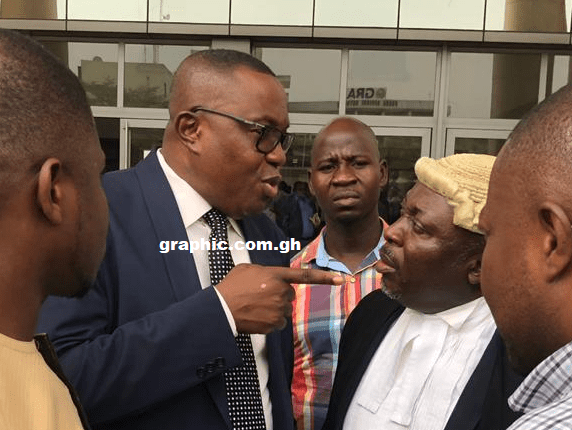
Prosecution witness in Ofosu Ampofo's trial disowns statement
The trial of two national leaders of the opposition National Democratic Congress (NDC) — Samuel Ofosu Ampofo and Anthony Kwaku Boahen — started with a bombshell when a prosecution witness denied knowledge of his witness statement.
Ofosu Ampofo, the National Chairman of the NDC, and Boahen, a Deputy Communications Officer of the party, are standing trial over a leaked tape in which they were allegedly heard inciting violence against the leadership of the Electoral Commission (EC) and the National Peace Council (NPC).
Advertisement
The two have pleaded not guilty to conspiracy to commit assault against a public officer, while Ofosu Ampofo has pleaded not guilty to two counts of assault against a public officer.
At the start of the trial yesterday, the first prosecution witness, Benjamin Osei Ampofo Adjei, a journalist with Accra-based Adom FM, took the stand at the Accra High Court to testify.
The witness, however, became a liability to the prosecution when he denied knowledge of a statement that bore his signature and which was crucial to the prosecution’s case.
Even before the statement was presented to him to identify if the signature on it was his, Adjei had testified that the police had brought a statement to him to sign and that he had signed it because he was told it was part of investigations.
Below are the exchanges in court among Adjei, the prosecution witness; the lead prosecutor, Mrs Yvonne Atakora Obuobisa, who is also the Director of Public Prosecutions (DPP), and Justice Samuel Asiedu, the presiding judge.
DPP: Take a look at this witness statement. Can you identify the signature on it?
Adjei: The signature is mine, but this is the first time I am seeing this statement.
Justice Asiedu: If the signature on the statement is yours, how come this is the first time you are seeing this statement?
Statement admitted into evidence
After the denial by the witness, the DPP sought to tender the statement into evidence, but that was objected to by Mr Tony Lithur, lawyer for Ofosu Ampofo, and Dr Basit Aziz Bamba, counsel for Boahen.
In his objection, Mr Lithur argued that per the practice direction on disclosures, all parties (prosecution and defence) must agree before a witness statement could be tendered as evidence.
According to him, the defence had not agreed for the statement to be tendered because the witness had denied knowledge of it.
In response, Mrs Obuobisa refuted the argument by the defence and submitted that the rule of admissibility of a witness statement required a witness statement to be dated and signed or thump-printed by the witness.
According to her, the statement was dated May 3, 2019, had been duly signed by the witness and, therefore, it must be admitted into evidence.
On claims by the witness that he did not author the statement but that it was brought to him to sign, the DPP said Adjei gave a statement to the police on March 25, 2019 and it was that statement which was turned into a witness statement which he duly signed.
“Once he has signed it and it was prepared from his police statement, it must be adopted as evidence,” the DPP argued.
In his ruling, Justice Asiedu agreed with the prosecution and held that so far as the statement contained the signature of the witness, it must be adopted as evidence.
“To the extent that the witness has identified his signature on the statement, the statement is valid and acceptable,” Justice Asiedu ruled.
The prosecution is trying to build a case that on February 20, 2019, Boahen allegedly admitted in a radio interview with Adjei that the alleged meeting at which Ofosu Ampofo was said to have incited people against the EC and the NPC did take place and that he (Boahen) was present at the meeting.
An audio recording of the said interview between Adjei and Boahen had been attached to Adjei’s witness statement, while Adjei supposedly admitted in his witness statement that the said interview took place.
The witness statement is, therefore, crucial to the prosecution’s case.
Audio recording
After the witness statement had been admitted as evidence, the defence argued hat the audio recording attached to the statement must be tendered separately as evidence.
According to Mr Lithur, the witness statement clearly stated that the witness would tender the audio recording in court.
The court agreed, but held that the audio recording must be played to the hearing of the court for the witness to identify whether or not that was the right audio recording.
However, there was no gadget in the courtroom to play the audio recording. Also, Dr Bamba made a case that he had not been served with a copy of the recording.
The court, therefore, adjourned the trial to February 5, 2020.
Prosecution’s facts
According to the prosecution’s facts, following the Ayawaso West Wuogon by-election debacle on January 31, 2019, Ofosu Ampofo met with some NDC communicators on February 3, 2019.
The facts explained that at the said meeting, Ofosu Ampofo and Boahen set out a road map of criminal activities, including violence against the EC Chairperson, Mrs Jean Mensa, and the Chairman of the NPC, the Most Rev. Prof. Emmanuel Asante.
It said an audio recording of the said meeting was leaked, leading to investigations by the Criminal Investigation Department of the Ghana Police Service into the comments on the tape.
The prosecution added that on February 20, 2019, Boahen granted a radio interview in which he confirmed his participation in the meeting and also revealed that the leaked audio recording was a true reflection of what had transpired at the February 3, 2019 meeting.



